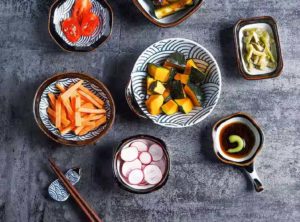Healthy eating, pleasure and portions: a balance to aim for
When it comes to nutrition, it can be complex to combine health, pleasure and portion control. However, all three are essential to maintaining a harmonious relationship with food. This article explores how to adopt a healthy diet while enjoying culinary pleasures and controlling portion sizes.
The key to healthy eating: balance and variety
A healthy diet is based on a balance between the different food groups: fruit, vegetables, wholegrain cereals, lean proteins and quality fats. This principle is supported by the recommendations of health authorities such as the World Health Organisation (WHO), which suggests filling half your plate with fruit and vegetables, including lean proteins (fish, legumes, lean meat) and opting for unsaturated fats, such as those found in olive, avocado and nut oils.
Eating a wide variety of foods helps to ensure a sufficient supply of essential nutrients: vitamins (C, B12, D), minerals (calcium, iron, magnesium) and dietary fibre. Fibre, for example, contributes to optimal digestion and helps regulate blood sugar levels, thereby reducing the risk of chronic diseases such as type 2 diabetes.
An overly restrictive approach can lead to deficiencies and compulsive eating habits. Introducing a flexible model, without strict food bans, encourages long-term adherence to healthy habits without frustration.
Pleasure: a factor in sustainability
The pleasure of eating is often overlooked in restrictive diets. Yet the sensory aspect of meals, whether it’s the aromas, textures or colours of food, plays an essential role in maintaining healthy eating habits over the long term. From a psychological point of view, pleasure is a motivating factor in making sustainable food choices.
To incorporate pleasure into healthy eating, here are a few strategies based on research into psychology and eating behaviour:
- Presentation of dishes: Studies show that careful presentation of meals stimulates saliva production and increases perceived satisfaction. A colourful, texturally rich and well-presented dish is not only more pleasant to eat, but also more nutritious.
- Mindful eating: Mindfulness helps us to manage the amount of food we eat and improve our perception of taste. Eating slowly, taking the time to savour each mouthful, can contribute to better regulation of satiety, which helps prevent overeating.
- Explore new flavours: Culinary diversity, such as incorporating spices and aromatic herbs, helps to stimulate the taste buds without adding excessive calories. For example, curcumin, an active compound in turmeric, has anti-inflammatory and antioxidant properties.
Managing portions: an essential habit

Portion management is crucial to avoiding over-consumption and maintaining a healthy weight. A poorly managed portion can lead to excessive energy intake, even when food choices are healthy. Portion size has a direct impact on weight regulation, particularly when it comes to carbohydrate portions, which influence insulin production and blood glucose management.
Here are some practical tips:
- Use smaller plates: This simple change can help to reduce portions without it being perceived as a restriction. It creates an illusion of satisfaction and reduces the risk of overeating.
- Serve meals in the kitchen: Placing meals on the table can encourage ‘impulse eating’. Serving plates in the kitchen reduces the temptation to refill, which can help to better regulate the amount eaten.
- Recognising hunger and satiety signals: Listening to your body is essential to avoid eating out of boredom, stress or emotion. Satiety signals are regulated by hormones such as leptin and ghrelin. Leptin, produced by fat cells, signals to the brain that we are full, while ghrelin stimulates the appetite when it’s time to eat.
- Opt for individual portions: By opting for individual portions, you have better control over the amount of food you eat and avoid the temptation to increase the portion once you’ve served it.
Find your own balance
Health, pleasure and portions are not opposites. By cultivating a caring and flexible approach, it’s possible to enjoy every meal while taking care of your body. This approach involves continuous learning about managing body signals, listening to your needs and integrating eating practices that foster a positive relationship with food.
For those looking for practical solutions, services such as those offered by https://allcook.ch/fr/faible-en-glucides-detox/, which prepare healthy meals tailored to individual needs, can be an excellent option for combining pleasure, health and time savings.




